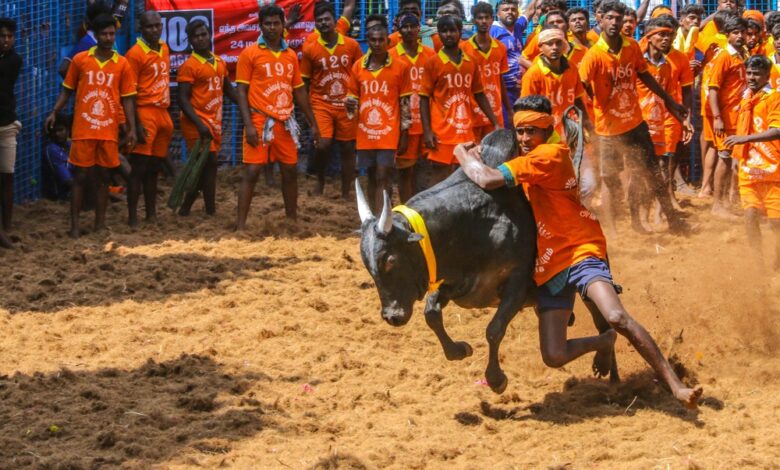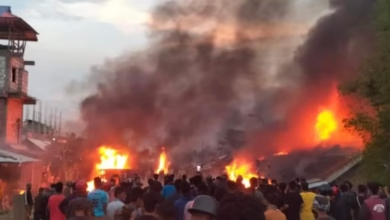
Introduction
The much-anticipated Jallikattu event has officially commenced in Madurai, Tamil Nadu, marking the beginning of a thrilling tradition during the Pongal festival. This year, the event features an impressive lineup of 1,100 bulls and 900 tamers, showcasing the passion and excitement that this iconic sport brings to the region. Jallikattu, a centuries-old sport, holds immense cultural significance for the people of Tamil Nadu, and the festival is expected to attract thousands of spectators and participants from across the state.
The Spirit of Jallikattu
Jallikattu is not just a sport; it is a celebration of Tamil Nadu’s rich heritage, bravery, and the deep connection between humans and animals. The event involves tamers attempting to tame bulls by holding onto their hump or horns as the animal runs through a designated area. The tamers showcase their skill, strength, and courage in front of an enthusiastic crowd. Jallikattu is traditionally held during the Pongal festival, a time when the Tamil community celebrates the harvest and gives thanks to nature and livestock.
The event is deeply rooted in Tamil culture and is seen as a symbol of Tamil pride and valor. For many, participating in or witnessing Jallikattu is a cherished tradition that strengthens community bonds and preserves ancient customs.
Safety Measures and Regulations
While Jallikattu has long been a part of Tamil Nadu’s cultural fabric, the event has also been met with concerns over the safety of both bulls and tamers. In recent years, authorities have placed strict regulations to ensure a safer environment for all participants and animals. This year’s event has implemented several enhanced safety measures aimed at minimizing risks and ensuring a smooth experience for everyone involved.
The safety protocols include the presence of medical teams stationed at various points around the event grounds, equipped to handle any emergencies. Additionally, all tamers are required to wear protective gear, including helmets and pads, to reduce the risk of injury. Safety barriers have been placed to keep the audience at a safe distance from the action.
Furthermore, the bulls participating in the event undergo thorough veterinary checks to ensure they are in good health and fit for the sport. Only those animals deemed healthy and capable are allowed to participate, ensuring the welfare of the bulls.
Cultural Significance and Local Support
Jallikattu is more than just a sport; it is an integral part of Tamil Nadu’s cultural identity. For many people in rural areas, Jallikattu represents pride, honor, and a celebration of their agrarian lifestyle. The sport also plays a role in preserving indigenous bull breeds, such as the Ariyalur and Pulikulam, which are prized for their strength and endurance.
Despite occasional debates over animal rights and welfare, the sport has the unwavering support of many in Tamil Nadu, who view it as a vital tradition that connects them to their ancestors. During the Pongal festival, Jallikattu brings people together, regardless of age or background, to participate in or witness the spectacle.
The local government and organizers have worked diligently to ensure that the event remains a highlight of the Pongal celebrations. In addition to the sporting event, Jallikattu also attracts tourists who come to experience Tamil Nadu’s vibrant culture firsthand. The festival not only showcases the strength and skill of the tamers and bulls but also serves as an opportunity for the state to celebrate its unique traditions on a global stage.
The Road Ahead for Jallikattu
As Jallikattu continues to evolve, efforts to balance tradition with modern safety standards will be critical. The event remains a subject of national debate, with ongoing discussions about the ethical concerns surrounding the treatment of animals. However, the commitment to preserving Tamil Nadu’s cultural legacy while ensuring the welfare of both tamers and bulls remains at the forefront of organizers’ efforts.
The event is expected to continue until the end of the Pongal festival, drawing large crowds and offering a unique insight into the region’s cultural and agricultural roots. The combination of thrilling action, community spirit, and deep-rooted tradition makes Jallikattu an event that continues to inspire pride and passion in the hearts of those who participate and watch.
Conclusion
The Jallikattu event in Madurai is a spectacular display of bravery, tradition, and cultural pride. With 1,100 bulls and 900 tamers participating in this year’s event, the excitement is palpable as the festival unfolds. Through strict safety measures and continued efforts to preserve Tamil Nadu’s heritage, Jallikattu remains a cherished tradition that brings together people from all walks of life to celebrate the bond between humans and animals.
As the event continues through the Pongal festival and beyond, it will undoubtedly remain a cornerstone of Tamil Nadu’s cultural identity and an exciting spectacle for generations to come.





